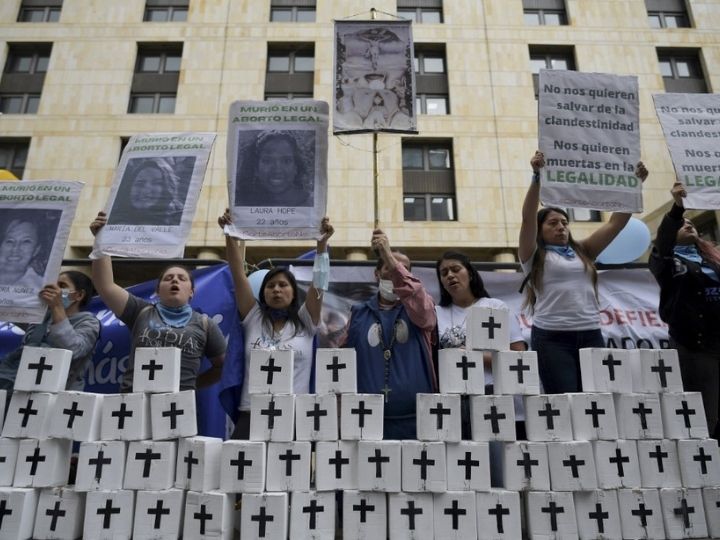‘Historic Victory’: Abortion During First 24 Weeks Of Pregnancy Is Now Legal In Colombia
Colombia earlier allowed abortion only if there was a risk to woman's life; life-threatening foetal malformations; if pregnancy was result of incest, rape, or non-consensual artificial insemination.

New Delhi: After Mexico and Argentina, another Latin American country has relaxed abortion laws. In what is being celebrated as a “historic victory” for reproductive rights, Colombia has decriminalised abortion during the first 24 weeks of pregnancy.
The constitutional court of the South American country Monday ruled five against four to decriminalise the procedure, The Guardian reported.
Colombia earlier allowed abortion only when there was a risk to the life or health of the mother; if there existed any life-threatening foetal malformations; or if the pregnancy was a result of incest, rape or non-consensual artificial insemination.
Latin America, with a powerful Catholic and evangelical Christian lobby, is a traditionally conservative region. The abortion laws here have been very restrictive, and the procedure is often banned outright. Women getting illegal abortions can face up to three years in jail in the country.
According to the report in The Guardian, an estimated 400,000 abortions are performed each year in Colombia, but only 10 per cent of them are carried out legally. At least 26,223 unsafe abortions were carried out across Colombia in 2020, according to local reproductive healthcare provider Profamilia.
Quoting Causa Justa, a Colombian women’s rights coalition, the report said at least 350 women, including girls under the age of 18, were convicted or sanctioned for abortions between 2006 and mid-2019.
“Now, instead of punishing them, the Colombian authorities will have to recognise their autonomy over their bodies and their life plans,” Erika Guevara-Rosas, Americas director at Amnesty International, said in a statement after the Colombian court’s order.
“We celebrate this ruling as a historic victory for the women’s movement in Colombia that has fought for decades for the recognition of their rights. Women, girls and people able to bear children are the only ones who should make decisions about their bodies,” said Erika.
“Our challenge now is to ensure that this ruling is implemented,” said Cristina Rosero, lawyer for the New York-based advocacy group Center for Reproductive Rights, which was one of the five organisations that filed a lawsuit in 2020 to get the court to review Colombia’s abortions laws.
Not All Happy With Colombia Court Decision
In Latin America, countries that allow abortions without restrictions until certain stages of pregnancy include Argentina, Uruguay and Cuba. In Mexico, a supreme court ruling recently said women cannot cannot be prosecuted for terminating pregnancies.
Last week, parliamentarians in Ecuador eased regulations that now allow access to abortion in cases of rape.
Some countries, however, continue to prohibit abortion without exception — El Salvador, Nicaragua, Honduras and the Dominican Republic, for example.

After Monday's ruling in Colombia, as protesters in favour of access to abortion celebrated in front of the constitutional court in capital Bogotá, also seen were anti-abortion protesters who demonstrated against the ruling.
“We don’t understand how this happened,” Jonathan Silva, an activist for the pro-life group United for Life, was quoted as saying in an AP report. He said he was surprised by the court's decision. "But we will have to stage protests, and call on members of congress to regulate abortion.”
It may be mentioned here that judges had met several times in the past two years to review the lawsuit filed by women’s rights groups, but refrained from voting on it.
In a poll conducted last year, 25 per cent of the people were found to consider abortion a crime, the AP report said.
Check out below Health Tools-
Calculate Your Body Mass Index ( BMI )
Trending News
Top Headlines








































